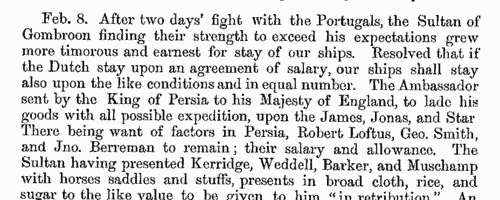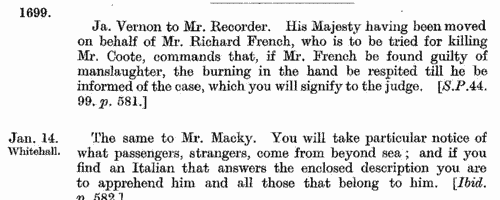Barkly Surname Ancestry ResultsOur indexes 1000-1960 include entries for the spelling 'barkly'. In the period you have requested, we have the following 35 records (displaying 1 to 10): Single Surname Subscription | | | Buying all 35 results of this search individually would cost £176.00. But you can have free access to all 35 records for a year, to view, to save and print, for £100. Save £76.00. More... |
These sample scans are from the original record. You will get scans of the full pages or articles where the surname you searched for has been found. Your web browser may prevent the sample windows from opening; in this case please change your browser settings to allow pop-up windows from this site. Carew Manuscripts
(1575-1588)
One of the few detailed sources surviving for 16th-century Ireland is this compilation of government papers and correspondence made by sir George Carew.BARKLY. Cost: £4.00.  | Sample scan, click to enlarge

| Middlesex Sessions
(1549-1603)
This printed calendar collates a number of surviving records from Middlesex sessions for the period. Principally these are the Gaol Delivery Rolls (G. D. R.) and the General Sessions of the Peace Rolls (G. S. O. P. R.). Both series cover general criminal indictments (bills) together with the recognizances of the witnesses to attend; but the Gaol Delivery Rolls, by their very nature, tend to deal with the more serious cases - felonies where the accused could not be released on bail. The General Sessions rolls also include the sheriff's lists of bailiffs, sub-bailiffs, high and petty constables in the shire; writs of venire facias for production of jurors, writs of capias, lists of jurors, jury-panels &c. The Gaol Delivery Rolls also include coroners' inquests, writs of supersedeas, and memoranda of proclamations. Special inquiries are recorded in separate Sessions of Oyer and Terminer (S. O. T.) rolls and Inquest or Inquisition rolls (I. R.) Although coverage is good, none of the sequences of rolls for this period is complete. A peculiarity of this calendar is that in the case of actual incidents, the date given at the start of each entry is the date that the incident was alleged to have taken place (for instance, 1 June 11 Elizabeth (1569) in the sample scan) rather than the date of the court proceedings. BARKLY. Cost: £4.00.  | Sample scan, click to enlarge

| British in the East
(1625-1629)
The East India State Papers centre on the records of the East India Company, trading to India, the East Indies, Persia and China. They include the Court Minutes of the East India Company.BARKLY. Cost: £4.00.  | Sample scan, click to enlarge

| Suffolk householders
(1674)
Hearth tax was raised by assessing each householder on the number of chimneys to the dwelling. This provided a simple way to make a rough judgment as to the value of the dwelling: paupers were issued exemption certificates, but they too were listed at the end of each return. The returns were made by township, grouped by hundred. A complete copy of the hearth tax return for each shire was sent to the Exchequer: this is the return for Suffolk for Lady Day (25 March) 1674 (E 179/257/14) as printed in 1905 as Suffolk Green Book no xi, vol. 13. The numbers given are the numbers of hearths: where two or more people are grouped together with one number, it may be assumed that they were heads of separate households sharing a single building with that number of chimneys.BARKLY. Cost: £6.00.  | Sample scan, click to enlarge

| State Papers Domestic
(1699-1700)
The State Papers Domestic cover all manner of business relating to Britain, Ireland and the colonies, conducted in the office of the Secretary of State, as well as other miscellaneous records. 1 January 1699 to 31 March 1700.
BARKLY. Cost: £4.00.  | Sample scan, click to enlarge

| Official Papers
(1700-1702)
The State Papers Domestic cover all manner of business relating to Britain, Ireland and the colonies, conducted in the office of the Secretary of State as well as other miscellaneous records. Includes lists of passes to travel abroad. This abstract covers the period from 1 April 1700 to 4 March 1702, with an appendix of items dating back as early as 1689.
BARKLY. Cost: £4.00.  | Sample scan, click to enlarge

| Correspondence and Journal of Charles Talbot
(1674-1708)
Charles Talbot, earl and duke of Shrewsbury, served as Secretary of State, and this material includes his correspondence in that capacity from 1694 to 1700. He then proceeded on an extended tour of the Continent, from 1700 to 1706, of which he kept this journal. The collection also includes much personal correspondence, and some papers relating to the colonies in America and the West Indies.BARKLY. Cost: £4.00.  | Sample scan, click to enlarge

| Treasury Books
(1711)
Records of the Treasury administration in Britain, America and the colonies, for 1711. These also include records of the appointment and replacement of customs officers such as tide waiters and surveyors.BARKLY. Cost: £4.00.  | Sample scan, click to enlarge

|  Apprentices registered at Edinburgh
(1713-1715) Apprentices registered at Edinburgh
(1713-1715)
Apprenticeship indentures and clerks' articles were subject to a 6d or 12d per pound stamp duty: the registers of the payments usually give the master's trade, address, and occupation, and the apprentice's father's name and address, as well as details of the date and length of the apprenticeship. There are central registers for collections of the stamp duty in London, as well as returns from collectors in the provinces. There was a single collection for the whole of Scotland, made in Edinburgh. The sums collected are recorded in Scottish money, with conversion to sterling for transfer to London. A Scottish pund was worth 20 English pence. July 1713 to April 1715. (The sample entry shown on this scan is taken from a Norfolk return)BARKLY. Cost: £8.00.  | Sample scan, click to enlarge

|  Masters of Apprentices registered at Edinburgh
(1713-1715) Masters of Apprentices registered at Edinburgh
(1713-1715)
Apprenticeship indentures and clerks' articles were subject to a 6d or 12d per pound stamp duty: the registers of the payments usually give the master's trade, address, and occupation, and the apprentice's father's name and address, as well as details of the date and length of the apprenticeship. There are central registers for collections of the stamp duty in London, as well as returns from collectors in the provinces. There was a single collection for the whole of Scotland, made in Edinburgh. The sums collected are recorded in Scottish money, with conversion to sterling for transfer to London. A Scottish pund was worth 20 English pence. July 1713 to April 1715. (The sample entry shown on this scan is taken from a Norfolk return)BARKLY. Cost: £8.00.  | Sample scan, click to enlarge

|
Research your ancestry, family history, genealogy and one-name study by direct access to original records and archives indexed by surname.
|













